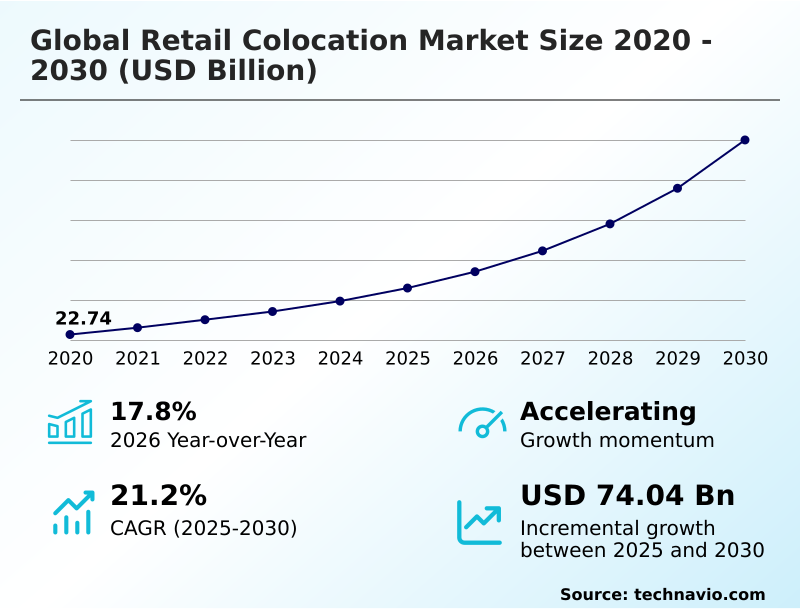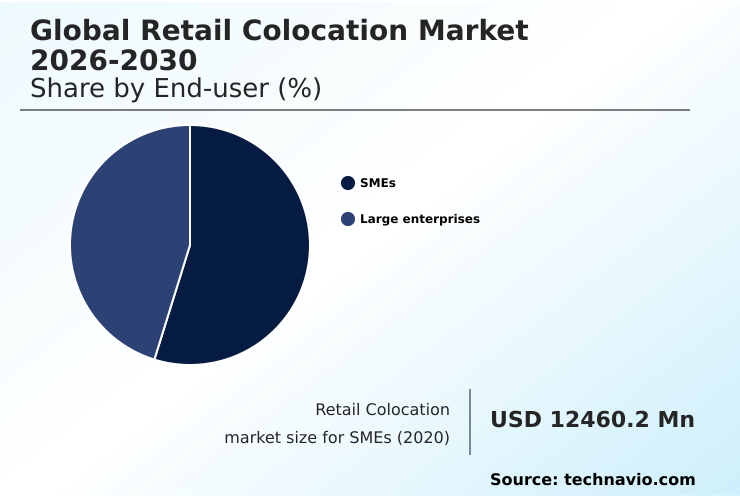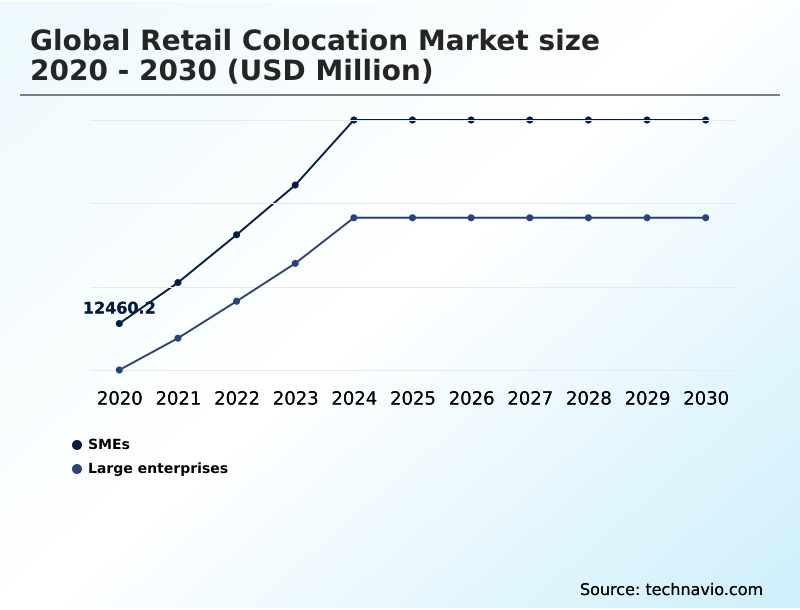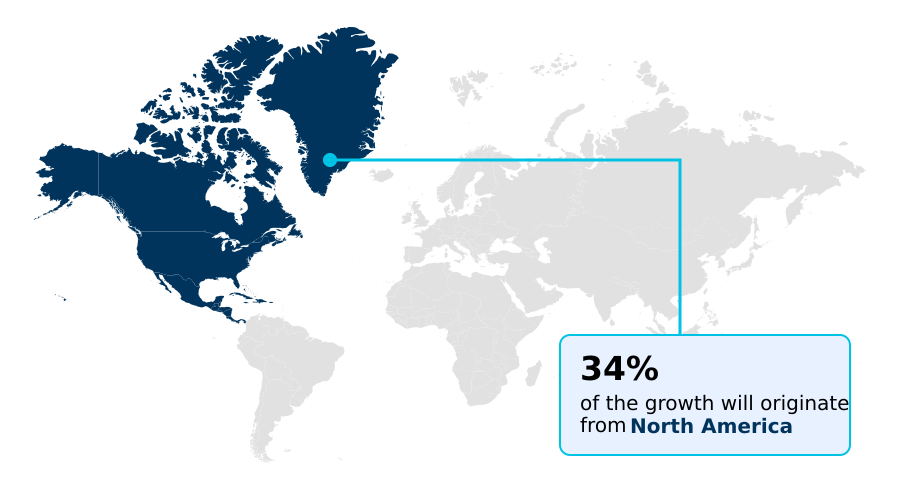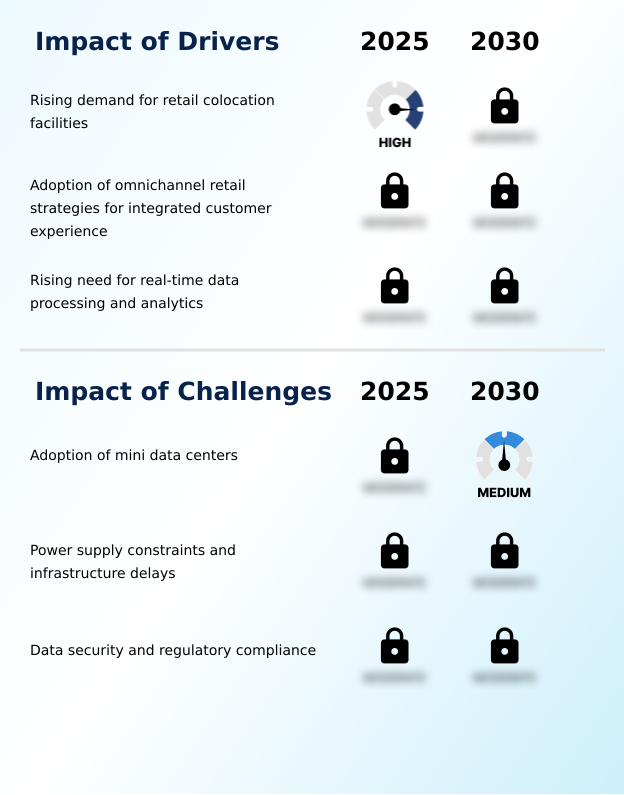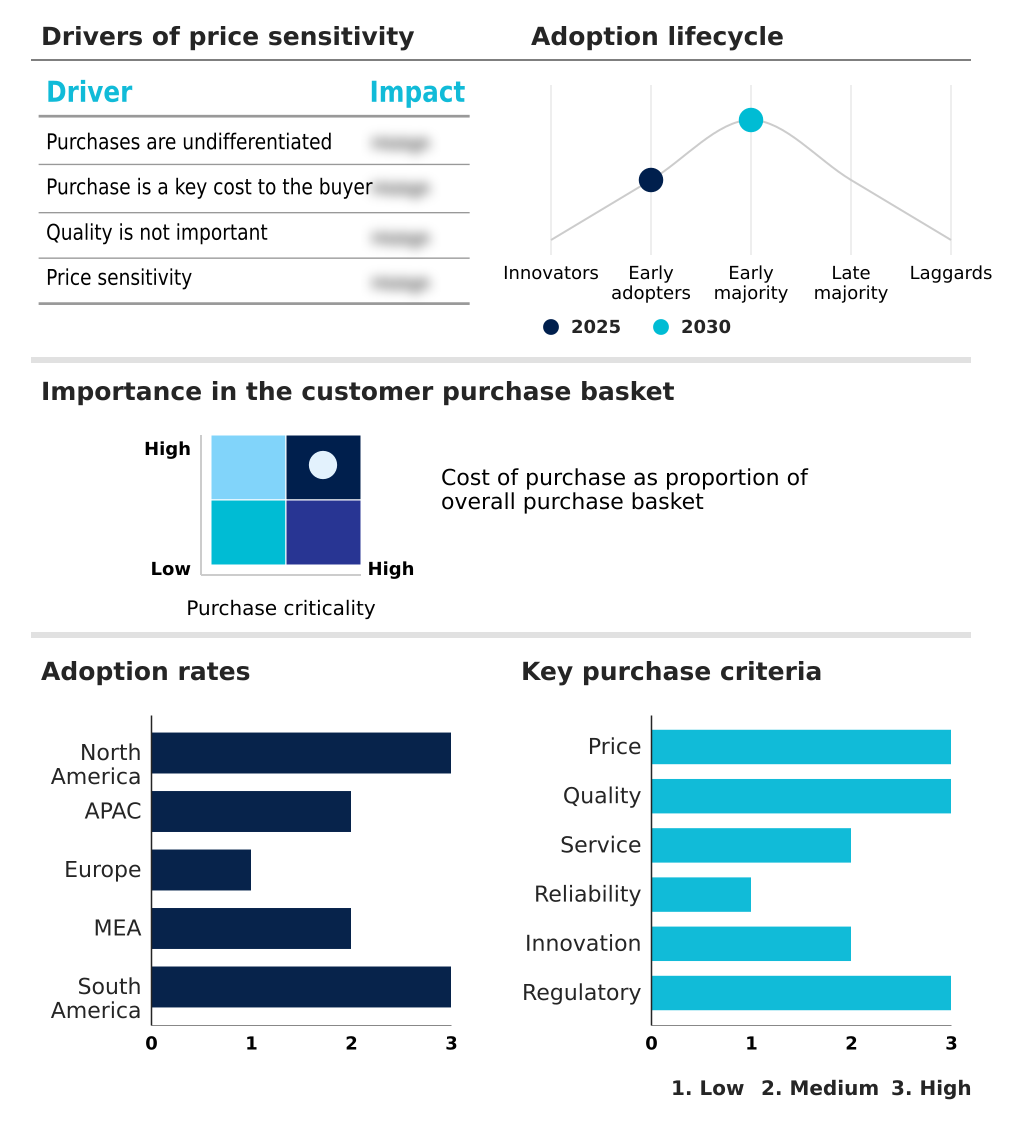Retail Colocation Market Size 2026-2030
The retail colocation market size is valued to increase by USD 74.04 billion, at a CAGR of 21.2% from 2025 to 2030. Rising demand for retail colocation facilities will drive the retail colocation market.
Major Market Trends & Insights
- North America dominated the market and accounted for a 34.5% growth during the forecast period.
- By End-user - SMEs segment was valued at USD 22.02 billion in 2024
- By Industry Application - IT and telecom segment accounted for the largest market revenue share in 2024
Market Size & Forecast
- Market Opportunities: USD 97.28 billion
- Market Future Opportunities: USD 74.04 billion
- CAGR from 2025 to 2030 : 21.2%
Market Summary
- The retail colocation market is experiencing significant transformation, driven by the enterprise-wide push for digital optimization and the escalating complexity of managing on-premise data centers. Businesses are increasingly outsourcing their IT infrastructure to gain access to carrier-neutral facilities that provide robust interconnection services and hybrid cloud architecture support.
- This shift is not merely about cost savings; it is a strategic move to ensure data sovereignty compliance and enhance digital service delivery. A primary trend is the adaptation of facilities to support high-density computing workloads, driven by AI and machine learning applications that require advanced liquid cooling solutions and redundant power systems.
- For instance, a financial services firm can deploy its algorithmic trading platforms within a low-latency colocation environment, ensuring high-speed market access while maintaining physical security protocols and meeting stringent regulatory requirements.
- However, the rise of decentralized infrastructure, including modular data center systems at the edge, presents a competitive challenge, forcing traditional retail colocation providers to innovate and expand their managed hosting services.
What will be the Size of the Retail Colocation Market during the forecast period?
Get Key Insights on Market Forecast (PDF) Request Free Sample
How is the Retail Colocation Market Segmented?
The retail colocation industry research report provides comprehensive data (region-wise segment analysis), with forecasts and estimates in "USD million" for the period 2026-2030, as well as historical data from 2020-2024 for the following segments.
- End-user
- SMEs
- Large enterprises
- Industry application
- IT and telecom
- Healthcare
- Retail and e-commerce
- Energy and utility
- Others
- Service type
- Space colocation
- Managed services
- Interconnection
- Geography
- North America
- US
- Canada
- Mexico
- APAC
- China
- Japan
- India
- Europe
- UK
- Germany
- The Netherlands
- Middle East and Africa
- UAE
- Saudi Arabia
- South Africa
- South America
- Brazil
- Argentina
- Rest of World (ROW)
- North America
By End-user Insights
The smes segment is estimated to witness significant growth during the forecast period.
Small and mid-size enterprises are a critical customer segment, leveraging retail colocation to access enterprise-grade infrastructure without significant upfront capital expenditure.
These firms utilize services like cabinet colocation and managed hosting services to support mission-critical workloads, adopting an asset-light IT model. This approach enables enhanced IT infrastructure scalability and robust core IT asset protection.
The market's overall year-over-year expansion of 17.8% is partly fueled by SMEs' need for reliable IT infrastructure hosting with features like redundant power systems.
Colocation providers' flexible, pay-as-you-go billing models align with SME budgets, facilitating improved digital service delivery and supporting effective enterprise risk management in an increasingly complex technological landscape.
The SMEs segment was valued at USD 22.02 billion in 2024 and showed a gradual increase during the forecast period.
Regional Analysis
North America is estimated to contribute 34.5% to the growth of the global market during the forecast period.Technavio’s analysts have elaborately explained the regional trends and drivers that shape the market during the forecast period.
See How Retail Colocation Market Demand is Rising in North America Request Free Sample
The geographic landscape of retail colocation is diversifying beyond traditional hubs, driven by data localization regulation and the need for decentralized infrastructure.
North America continues to lead, accounting for 34.5% of the market's incremental growth, while the APAC market is expanding rapidly, with a projected contribution of 27.85%.
Enterprises are seeking carrier-neutral facilities that offer not only private suite leasing but also advanced disaster recovery services and improved power usage effectiveness (PUE).
This expansion supports edge computing node deployments, which are crucial for improving application performance monitoring and enabling supply chain modernization.
The adoption of software-defined networking (SDN) within these facilities ensures agile and cost-effective infrastructure, helping businesses meet data sovereignty compliance while leveraging flexible infrastructure-as-a-service (IaaS) models.
Market Dynamics
Our researchers analyzed the data with 2025 as the base year, along with the key drivers, trends, and challenges. A holistic analysis of drivers will help companies refine their marketing strategies to gain a competitive advantage.
- The strategic evaluation of retail colocation now extends beyond simple space and power, focusing on specialized use cases and economic models. A key area of interest is retail colocation for AI inference workloads, which demands infrastructure capable of high-density rack cooling strategies. Enterprises are conducting detailed retail colocation cost-benefit analysis, weighing it against other models.
- The public cloud vs retail colocation economics debate is particularly relevant, with many firms opting for a hybrid cloud deployment using colocation to balance cost and control. This is especially true for firms in regulated sectors, where achieving data sovereignty with colocation is paramount and retail colocation for healthcare compliance is a non-negotiable requirement.
- For smaller organizations, the benefits of retail colocation for smes include access to enterprise-grade infrastructure. A comparative analysis of edge data center vs retail colocation reveals distinct advantages for latency-sensitive applications. In practice, firms leveraging carrier-neutral retail colocation advantages and strong retail colocation network interconnection benefits report network performance improvements that are twice as effective as single-carrier solutions.
- The choice between a private suite vs cage colocation depends on security needs. Furthermore, understanding managed services in retail colocation, software-defined networking in colocation, and available retail colocation power and cooling options is crucial. These factors are vital for optimizing retail colocation for e-commerce platforms, achieving optimized latency with retail colocation, and ensuring global retail colocation market 2026-2030 security.
- Ultimately, retail colocation for disaster recovery remains a foundational use case.
What are the key market drivers leading to the rise in the adoption of Retail Colocation Industry?
- The rising demand for retail colocation facilities, driven by businesses seeking cost-effective and scalable solutions for their IT infrastructure, is a key driver of market growth.
- The rising demand for retail colocation is a primary market driver, as enterprises adopt a hybrid IT model to optimize their enterprise IT strategy and execute infrastructure modernization.
- Businesses are increasingly utilizing IT infrastructure hosting in Tier III data centers for business continuity planning, which can improve uptime to 99.982%. This strategy is crucial for supporting mission-critical workloads and ensuring reliable digital service delivery.
- By leasing rack space rental or a data center cage, companies can establish network points of presence (PoPs) in key locations, achieving low-latency connectivity that enhances data processing efficiency by as much as 30%.
- This approach provides a scalable and secure environment without the high costs of building and maintaining private facilities.
What are the market trends shaping the Retail Colocation Industry?
- The growing adoption of software-defined data centers is a significant trend, enhancing agility and scalability in physical infrastructure management. This shift enables centralized control and dynamic resource allocation for colocation providers.
- The growing adoption of the software-defined data center (SDDC) is a key trend, enabling automation and dynamic resource allocation that can reduce provisioning times by up to 40%. This trend supports enterprise digital transformation initiatives by facilitating flexible hybrid cloud architecture and seamless multi-cloud environment integration.
- It allows for greater workload mobility and IT infrastructure scalability, which is critical for managing technology lifecycle management. As AI training workloads and high-density computing become more common, SDDCs are essential for managing GPU cluster support efficiently.
- This shift allows businesses to optimize operational expenditure (OPEX) and leverage platform-as-a-service (PaaS) offerings within a vendor-neutral ecosystem, improving service reliability by over 25% in some deployments.
What challenges does the Retail Colocation Industry face during its growth?
- The increasing adoption of mini data centers for edge computing applications presents a notable challenge to the traditional retail colocation market.
- The adoption of mini or modular data center systems for edge applications presents a challenge, as they offer a cost-effective infrastructure for localized high-performance computing (HPC), reducing reliance on large, centralized facilities. These systems can improve application performance monitoring by processing data closer to the source, decreasing latency by over 50% in some use cases.
- This decentralization pressures traditional retail colocation providers, who operate large Tier IV facilities with extensive power and cooling infrastructure, to adapt. While colocation offers superior physical security protocols and a rich cross-connect ecosystem, the flexibility of modular systems is appealing.
- To remain competitive, providers are enhancing their offerings with remote hands support and specialized liquid cooling solutions, integrating edge capabilities to support effective IT service management (ITSM) and enterprise risk management.
Exclusive Technavio Analysis on Customer Landscape
The retail colocation market forecasting report includes the adoption lifecycle of the market, covering from the innovator’s stage to the laggard’s stage. It focuses on adoption rates in different regions based on penetration. Furthermore, the retail colocation market report also includes key purchase criteria and drivers of price sensitivity to help companies evaluate and develop their market growth analysis strategies.
Customer Landscape of Retail Colocation Industry
Competitive Landscape
Companies are implementing various strategies, such as strategic alliances, retail colocation market forecast, partnerships, mergers and acquisitions, geographical expansion, and product/service launches, to enhance their presence in the industry.
AT and T Inc. - Provides scalable data center solutions, including secure rack, cage, and cabinet leases for deploying critical IT infrastructure.
The industry research and growth report includes detailed analyses of the competitive landscape of the market and information about key companies, including:
- AT and T Inc.
- China Telecom Corp. Ltd.
- China Unicom Hong Kong Ltd.
- Cogent Communications Inc.
- CoreSite Realty Corp.
- CyrusOne LLC
- DataBank Holdings Ltd.
- Digital Realty Trust Inc.
- EdgeConneX Inc.
- Equinix Inc.
- Flexential Corp.
- Global Switch Ltd.
- KDDI Corp.
- NTT Communications Corp.
- phoenixNAP LLC
- Terago Inc.
- TierPoint LLC
- Verizon Communications Inc.
- VNET Group Inc.
- Yotta Data Services Pvt. Ltd.
Qualitative and quantitative analysis of companies has been conducted to help clients understand the wider business environment as well as the strengths and weaknesses of key industry players. Data is qualitatively analyzed to categorize companies as pure play, category-focused, industry-focused, and diversified; it is quantitatively analyzed to categorize companies as dominant, leading, strong, tentative, and weak.
Recent Development and News in Retail colocation market
- In August 2025, Walmart announced a strategic partnership to deploy VMware Cloud Foundation across its global infrastructure, creating a massive private cloud to modernize applications and run AI-driven tools.
- In May 2025, NTT DATA announced an accelerated expansion of its global data centers division, securing land to support nearly a gigawatt of planned capacity as part of a USD 10 billion investment through 2027.
- In March 2025, Digital Realty formed a 50-50 joint venture with Bersama Digital Infrastructure Asia to enter the Indonesian colocation market, adding facilities in Jakarta with an initial 5 MW IT capacity.
- In February 2025, Equinix inaugurated its PA13x colocation data center near Paris, a facility with up to 28.8 MW of IT load designed for high-density AI workloads and featuring advanced sustainability elements.
Dive into Technavio’s robust research methodology, blending expert interviews, extensive data synthesis, and validated models for unparalleled Retail Colocation Market insights. See full methodology.
| Market Scope | |
|---|---|
| Page number | 290 |
| Base year | 2025 |
| Historic period | 2020-2024 |
| Forecast period | 2026-2030 |
| Growth momentum & CAGR | Accelerate at a CAGR of 21.2% |
| Market growth 2026-2030 | USD 74039.4 million |
| Market structure | Fragmented |
| YoY growth 2025-2026(%) | 17.8% |
| Key countries | US, Canada, Mexico, China, Japan, India, South Korea, Australia, Indonesia, UK, Germany, The Netherlands, Spain, France, Italy, UAE, Saudi Arabia, South Africa, Egypt, Israel, Brazil, Argentina and Chile |
| Competitive landscape | Leading Companies, Market Positioning of Companies, Competitive Strategies, and Industry Risks |
Research Analyst Overview
- The retail colocation market is evolving to meet the demands of high-density computing, driven by AI training workloads and the need for robust GPU cluster support. Businesses now prioritize hybrid cloud architecture and seamless multi-cloud environment integration, leveraging carrier-neutral facilities for their rich interconnection services and cross-connect ecosystems.
- This shift supports data sovereignty compliance and provides low-latency connectivity crucial for mission-critical workloads. The adoption of software-defined data center (SDDC) and software-defined networking (SDN) technologies is fundamental, allowing enterprises to manage their IT infrastructure hosting more dynamically. Facilities are upgrading their power and cooling infrastructure, with many implementing advanced liquid cooling solutions.
- Offerings range from rack space rental and cabinet colocation to secure data center cages and private suite leasing in Tier III and Tier IV facilities. A key boardroom consideration is the agility gained; for example, some firms stand up secure private AI environments in less than 48 hours.
- This ecosystem, supported by managed hosting services, remote hands support, and strong physical security protocols, enables effective disaster recovery services and ensures the reliability of network points of presence (PoPs), all while utilizing flexible pay-as-you-go billing and modular data center systems at the edge computing node to optimize the network fabric management of enterprise-grade infrastructure.
What are the Key Data Covered in this Retail Colocation Market Research and Growth Report?
-
What is the expected growth of the Retail Colocation Market between 2026 and 2030?
-
USD 74.04 billion, at a CAGR of 21.2%
-
-
What segmentation does the market report cover?
-
The report is segmented by End-user (SMEs, and Large enterprises), Industry Application (IT and telecom, Healthcare, Retail and e-commerce, Energy and utility, and Others), Service Type (Space colocation, Managed services, and Interconnection) and Geography (North America, APAC, Europe, Middle East and Africa, South America)
-
-
Which regions are analyzed in the report?
-
North America, APAC, Europe, Middle East and Africa and South America
-
-
What are the key growth drivers and market challenges?
-
Rising demand for retail colocation facilities, Adoption of mini data centers
-
-
Who are the major players in the Retail Colocation Market?
-
AT and T Inc., China Telecom Corp. Ltd., China Unicom Hong Kong Ltd., Cogent Communications Inc., CoreSite Realty Corp., CyrusOne LLC, DataBank Holdings Ltd., Digital Realty Trust Inc., EdgeConneX Inc., Equinix Inc., Flexential Corp., Global Switch Ltd., KDDI Corp., NTT Communications Corp., phoenixNAP LLC, Terago Inc., TierPoint LLC, Verizon Communications Inc., VNET Group Inc. and Yotta Data Services Pvt. Ltd.
-
Market Research Insights
- The enterprise IT strategy is shifting toward a hybrid IT model, spurring infrastructure modernization and digital transformation initiatives that leverage retail colocation. This transition to an asset-light IT model allows for better IT service management (ITSM) and supports business continuity planning.
- Organizations engaging in supply chain modernization achieve up to 15% greater data processing efficiency by using vendor-neutral ecosystems for low-latency connectivity. Furthermore, decentralized infrastructure is essential for resource-intensive applications, while core IT asset protection is ensured through stringent regulatory compliance management. This approach improves application performance monitoring, providing a cost-effective infrastructure for data-intensive workloads.
- As part of enterprise risk management, this model offers enhanced IT infrastructure scalability and workload mobility, with some firms reporting a 20% reduction in capital expenditure (CAPEX) in favor of operational expenditure (OPEX). This facilitates superior digital service delivery for high-performance computing (HPC) and optimized network traffic routing, all while managing the technology lifecycle.
We can help! Our analysts can customize this retail colocation market research report to meet your requirements.

